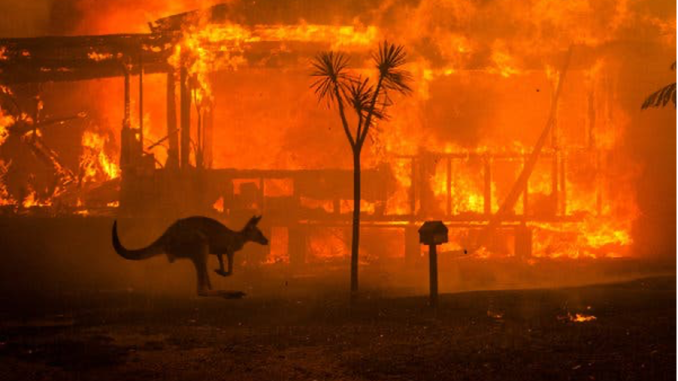
Story Topic and Angle
I plan to write a news commentary on “Australia’s bushfire crisis and the urgent need for climate action.” With an SEO title, “Scorched Earth: How Australia’s Bushfire Crisis is Fueling the Urgent Call for Climate Action.”
Angle: The article will discuss the devastating bushfire season in Australia in 2019-2020, with over 18 million hectares burned and billions of animals affected, fueled by various factors, including drought, heatwaves, and strong winds, all exacerbated by climate change. The fires underscored the devastating impact of human-induced climate change on the environment, wildlife, and communities. In this commentary, I will explore how the bushfire crisis highlights Australia’s urgent need for climate action and call on the government to take more decisive steps toward reducing greenhouse gas emissions and promoting renewable energy.
Intended Publication and Target Audience
This commentary piece targets activists and advocates for climate action who seek ways to raise awareness and mobilize support. The Guardian is the preferred online publication for this article.
Source of Information
According to the World Report 2023, Australia is among the top 20 emitters and one of the world’s biggest per capita emitters of greenhouse gases responsible for the climate crisis. The article will discuss recent pledges from Prime Minister Albanese to end the “climate wars” and promote renewable energy. The article will also highlight that the Australian government is still actively supporting the expansion of fossil fuel industries and denying responsibility for emissions created by the vast amounts of coal and gas Australia exports overseas.
Moreover, the article will discuss the United Nations Human Rights Committee‘s finding that the Australian government violated the rights of Indigenous Torres Strait Islanders by failing to adequately protect them against the adverse impacts of climate change. It will also explore cultural approaches to controlling fire and caring for the land, such as cultural burning practiced by First Nations groups. It will highlight the benefits of low-intensity burns with detailed knowledge of a place. For example, these burns can support vegetation and wildlife and reduce the scale of bushfires.
The article will highlight the significant economic impact of bushfires. For example, many Australian businesses were affected, and the fishing and tourism industries were hit hard, compounded by lockdowns and travel bans related to COVID-19. The Insurance Council estimated that insured claims for bushfire losses were around $A1.9 billion (US$1.3 billion). The impact of the bushfires on wildlife is discussed, with over a billion animals, including 800,000 in NSW, losing their lives in the fires. The article will emphasize the pressing need for prompt and effective climate action, calling for policymakers to prioritize adopting renewable energy solutions, cultural burning practices, and other measures to reduce carbon emissions and mitigate climate change’s impact.
Multimedia, Hypertext, and Interactivity
This commentary will include the following:
- Reliable information from World Report 2023
- Reliable data from The Insurance Council
- Useful information from United Nations Human Rights Committee
- Reliable information and ideas from Disaster Philanthropy
- Infographics to support this commentary from com
- An interview of a survivor of the Australian bushfires of 2019




The link between climate change and the Black Summer Bushfires is certainly well proven, and I will never forget seeing the images of smoke covering Sydney Harbour ahead of the New Year’s Fireworks. The only comment that I have, is the political problems facing the Government in the Senate, where, ahead of the passing of the Safety mechanism, the Federal Government had to go to the cross bench in order to get the legislation over the line. My question here, is does the fact that the Federal Government has to work with the Crossbench, including the Greens in the Senate, is forcing them to act on climate change, despite the fact that the Eastern States are facing an energy crisis this winter?
Hi Zhaowen, I really like the topic you chose about the Australian bushfires and climate change. Although the devastating bushfires of 2019-2020 in Australia were a few years ago, they continue to have serious climate impacts. This summer, there haven’t been similar disasters, so it seems like there aren’t many discussions on the topic, but I really hope to see that related topics are still being discussed. However, after browsing through most of the links and materials, most of them are from 2020 and 2022. I am more interested in seeing whether there have been any policies and actions implemented recently. Also, after the bushfires, I am curious about what actions the Australian government has taken or not taken in terms of protecting and restoring the burned forests. These are all the points that I am curious about, thank you.
The coverage of climate change is highly newsworthy, and the 2019-2020 bushfire in Australia is indeed creating an ongoing ecological crisis for this land. Thus I think this news commentary story will serve as a wake-up call to the government about the urgency of climate action in the third year after the disaster. However, I have a few questions and suggestions about this proposal. First, perhaps you could briefly address the reasons for choosing the Guardian as the publisher for this article, and is this relevant to your audience? In addition, I find that the resources you have cited so far are mainly reports and data from previous years, so I would suggest that you could add some data and news related to the recent changes implemented by the Australian government. Moreover, I am rather concerned about your feasibility of interviewing survivors of the 2019 bushfire, and I hope this will not increase the difficulty of your research. Regarding multimedia, in addition to infographics, I would suggest adding some live slideshow or videos of the bushfire to show the urgency of the climate crisis. Overall, this would be an informative commentary, looking forward to the full article!